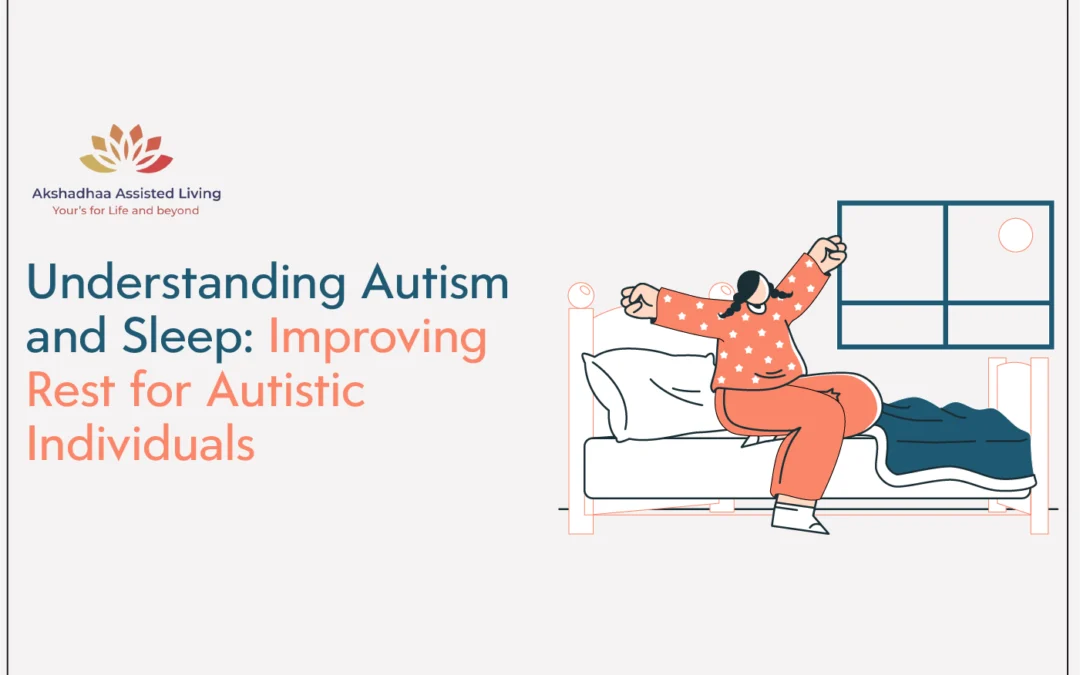What if sleep were not something meant only for rest but a way to bring balance to both mind and body? For those with autism, the impact of autism on sleeping is a form of unique challenge. Increased sensitivity to sensory, odd sleeping times, or higher stress levels can make for restless nights. However, knowledge is not only the recognition of these challenges but also finding real solutions that lead the path to waking up to brighter days and falling asleep to peaceful nights.
Want to know more? Let’s dive into the challenges and hands-on ways of improving sleep in autism.
The Connection Between Autism and Sleep
The National Institute of Health shows that 50 – 80% of children and adolescents with ASD sleep problems are associated. This is linked to other unique characteristics specific to autism. The latter has excellent power in interfering with much sleep, an entire rest pattern, and, more generally, a well-being condition. Therefore, research on the autism-sleep nexus is significant for effective rest management strategies.
- Sensory issues: Sensory issues are a symptom of autism. Bright lights and loud noises might keep them up. Sometimes, the sensation of specific textures in fabrics makes it impossible for individuals with autism to fall asleep. Even increased sensitivity will provoke multiple arousals and hence lead to rest deprivation.
- Anxiety and stress: Most patients with autism present with higher than normal levels of anxiety and stress, which in turn prevent them from effectively winding down to sleep at night. This hyperarousal condition prevents sleep onset and reduces sleep quality, bringing about fatigue and crankiness.
- Sleep Disturbances: Irregular sleep cycles often plague those with autism. Sleep onset is challenging for some at conventional bedtime, and others wake frequently at night. The result is broken sleep, and the person may wake up feeling fatigued and unable to focus during the day.
- Medication Side Effects: Some medications for symptoms related to autism include stimulants or certain kinds of antidepressants, which in turn may hinder sleep. Although such medicines make the daytime easier to overcome, their after-effects create difficulties in implementing good sleeping habits.
Grasping such underlying elements by caregivers, as well as those who have autism, could give meaningful actions toward sleep troubles. Recognizing such interrelation between autism and sleep is only the first step in identifying practical solutions that lead to healthy nights and a quality lifestyle. Improved sleep time by sufferers, through proper management and sufficiency of aid, leads to better overall well-being and improved everyday functioning.
Common Sleep Issues in Autism:
Sleep problems among people with autism can be very different but usually include:
- Difficulty initiating sleep: Restlessness or the inability to calm the mind and body can delay sleep onset, reducing total rest.
- Night waking: Even distant traffic noise may disturb sleep and cause multiple awakenings.
- Waking too early: Waking up earlier than wanted often results in fatigue during the day.
- Sleep Disturbances: Night terrors, nightmares, or sleepwalking are more common in people with autism, which again affects the quality of sleep.
If these issues of autism and sleep are not addressed, they may worsen other challenges associated with autism, such as behavioral problems, inability to focus, and social communication problems.
Causes of Sleep Issues in Autism
Autism and sleep problems are influenced by a combination of external and internal factors:
- Melatonin levels: Individuals with autism often have lower melatonin production, the hormone essential for regulating sleep-wake cycles. This can make falling and staying asleep more difficult.
- Gastrointestinal (GI) Discomfort: Conditions like bloating or constipation are prevalent among those with autism, which can be very uncomfortable, thereby affecting sleep.
- Brain Function Differences: Variations in sensory activity processing during sleep may cause disruptions to the attainment of restful sleep.
All these underlying causes help improve the quality of sleep in individuals with autism as well as their overall well-being.
The Impact of Poor Sleep:
Sleep disorders are not limited to nighttime but also have broad repercussions during the day. Autism-related poor sleep may result in the following:
- Increased irritability and aggressiveness
- Higher levels of anxiety and impulsiveness
- Difficulty focusing and retaining knowledge
- Decreased capability to handle challenges in daily life
Improvement in sleep quality is not only for rest, but it has a vital role in improving the quality of life among autistic individuals.
Read more – Supporting Parents and Caregivers: Understanding Autism and Memory Difficulties
Tips for Managing Autism and Sleep Challenges
For Adults with Autism
- Set a Bedtime Routine: Insist on bedtimes and waking times that tend to be consistent from one day to another, thus training the body’s internal clock.
- Create a sleep-conducive environment: Blackout curtains, white noise machines, keep calm, quiet room
- Reduce stimulation before bedtime: No screens, exciting movies, shows, video games, etc., at least not an hour before bed. Other ideas are to try soothing music and meditation.
- Watch Your Diet: Avoid caffeine, especially in the afternoon or evening, to avoid sleep disruptions.
- Consult a Professional: If medications are interfering with sleep, discuss alternatives or adjustments with a doctor.
For Children with Autism:
- Stick to a Bedtime Routine: Predictable routines help signal that it’s time to wind down. Include calming activities like reading or a warm bath.
- Optimize the Bedroom: Apply sensory-friendly tools, such as weighted blankets or soft lighting, for a comfortable resting place.
- Use visual schedules: children with autism can understand what’s expected of them with a visual bedtime routine.
- Meet Sensory Needs: Children can become secure and ready to sleep with familiar toys or calming tools.
- Consider Supplements: Talk to a healthcare provider about taking melatonin or another sleep aid if needed.
Behavioral Strategies for Better Sleep
- Reinforce Positive Sleep Habits: Reward consistent bedtime routines to encourage adherence.
- Gradual Changes: Adjust sleep times slightly if needed; give it some time to adapt to the changes.
- Limited Screen Time: Limit screen time at least an hour before bed, as electronic devices disrupt the natural production of melatonin.
- Encourage Daytime Activity: Activities should be performed during the daytime to improve night sleep.
Supporting Caregivers
Managing autism and sleep problems can be stressful, and caregivers must also focus on their self-care:
- Share Responsibilities: Involving family members or respite services can help share the burden.
- Take Breaks: Spend time doing something that nourishes your soul, like reading a book or walking.
- Seek Professional Help: Behavioral specialists and sleep therapists could offer individualized recommendations for controlling autism and sleep disorders.
Caregivers can better support their loved ones when they take care of themselves. Akshadhaa Assisted Living is dedicated to helping caregivers and families find the necessary balance while offering compassionate care and support.
Conclusion
The connection between autism and sleep is intricate, but the right approach can make a difference. Sensory sensitivities, irregular sleep patterns, and melatonin production play a key role, and understanding these factors helps caregivers take actionable steps. Consistent routines and sensory-friendly environments are vital for addressing sleep challenges and enhancing quality of life. With patience and tailored strategies, brighter days and restful nights become achievable.
Create a supportive and secure environment for autistic individuals at Akshadhaa Assisted Living. Your child’s safety and growth matter. Get in touch with Akshadhaa Assisted Living to explore a nurturing space for autistic individuals.
Follow us for more insights Linkedin

